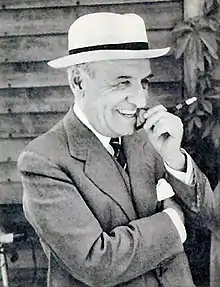List of Spaniards
This is a list, in alphabetical order within categories, of notable hispanic people of Spanish heritage and descent born and raised in Spain, or of direct Spanish descent.
Note: The same person may appear under several headings.
| |||||
| |||||
Actors
- Victoria Abril (born 1957)
- Elena Anaya (born 1975)
- Antonio Banderas (born 1960)
- Javier Bardem (born 1969)
- Pilar Bardem (born 1939)
- Claudia Bassols (born 1979)
- Ana Belén (born 1951)
- Àstrid Bergès-Frisbey (born 1986)
- Juan Diego Botto (born 1975)
- Mario Casas (born 1986)
- Diego Gilberte (born 1994)
- Mark Consuelos (born 1970)
- Penélope Cruz (born 1974)
- Gabino Diego (born 1966)
- Angelines Fernández (1922–1994)
- Fernando Fernán Gómez (1921–2007)
- Juan Luis Galiardo (1940–2012)
- Sancho Gracia (1936–2012)
- Alfredo Landa (1933–2013)
- Sergi López (born 1965)
- Jordi Mollà (born 1968)
- Sara Montiel (1928–2013)
- Paul Naschy (1934–2009)
- Fernando Rey (1917–1994)
- Fernando Sancho (1916–1990)
- María Valverde (born 1986)
- Paz Vega (born 1976)
- Maribel Verdú (born 1970)
Artists
- David Aja, comics artist
- Juan Caro de Tavira (fl. 17th century), painter
- Charris (born 1962), painter
- Chumy Chúmez (1927–2003), cartoonist
- Salvador Dalí (1904–1989), surrealist artist
- Óscar Domínguez (1906–1957), surrealist artist
- Pasqual Ferry, comics artist
- Francisco de Goya (1746–1828), painter and engraver
- El Greco (1541–1614), painter and sculptor
- Juan Gris (1887–1927), cubist painter
- Joan Miró (1893–1983), painter, sculptor and ceramist
- Joaquín Sorolla (1863–1923), painter
- Bartolomé Esteban Murillo (1618–1682), painter
- Carlos Pacheco (born 1961), comics artist
- Pablo Picasso (1881–1973), painter and sculptor, co-founder of cubism
- Antoni Tàpies (1923–2012), abstract expressionist painter
- Diego Velázquez (1599–1660), painter
- Ignacio Zuloaga (1870–1945), painter
- Francisco de Zurbarán (1598–1644), painter
- Antoni Gaudí (1852–1926), architecture, design, sculpture
- José de Creeft (1884–1982), sculptor and teacher
Explorers and conquerors
- Lope de Aguirre (1511–1561), soldier and adventurer, explored the Amazon River looking for El Dorado
- Diego de Almagro (1475–1538), explorer and conquistador, first European in Chile
- Luis de Moscoso Alvarado (1505–1551), explorer and conquistador.
- Juan Bautista de Anza (1736–1788), soldier and explorer, founded San Francisco, California
- Sebastián de Belalcázar (1480–1551), first explorer in search of El Dorado in 1535 and conqueror of Ecuador and southern Colombia (Presidencia of Quito), founded Quito 1534, Cali 1536, Pasto 1537, and Popayán 1537
- Fray Tomás de Berlanga (1487–1551), bishop of Panama, discovered the Galápagos Islands
- Juan Bermúdez (1450–1520), explorer and skier, discovered the Bermuda Islands
- Álvar Núñez Cabeza de Vaca (c. 1490–c. 1559), first European to explore the southwestern of what is now the United States (1528–1536), also explored South America (1540–1542)
- Juan Rodríguez Cabrillo (1499–1543), explorer, discovered California
- Andrés Dorantes de Carranza (ca. 1500–1550), explorer and one of the four last survivors of the Narváez expedition.
- Gabriel de Castilla (1577–1620), sailor; in 1603 he became probably the first man ever to sight Antarctica
- Cosme Damián Churruca (1761–1805), explorer, astronomer and naval officer, mapped the Strait of Magellan (1788–1789)
- Francisco Vásquez de Coronado (c. 1510–1554), explored New Mexico and other parts of the southwest of what is now the United States (1540–1542)
- Hernán Cortés (1485–1547), conquistador of the Aztec Empire, explorer of Baja California Peninsula
- Juan Sebastián Elcano (1476–1526), explorer and sailor, first man to circumnavigate the world
- Gaspar de Espinosa (1467/1477–1537), soldier and explorer, first European to reach the coast of Nicaragua, co-founder of Panama City
- Diego Duque de Estrada (1589–1647), soldier, explorer, writer
- Salvador Fidalgo (1756–1803), naval officer and cartographer, explored Alaska in 1790, he named Cordova, Port Gravina, and Valdez
- Miguel López de Legazpi (1502–1572), explored and conquered the Philippine Islands in 1565
- Vasco Núñez de Balboa (1475–1519), first European to sight the Pacific Ocean, founder of Darién
- Francisco de Orellana (c. 1500–c. 1549), first European to explore the Amazon River
- Pedrarias Dávila (Pedro Arias de Ávila, 1440–1531), conquistador, founder of Panama and governor of Nicaragua
- Francisco Pizarro (1471–1541), conqueror of the Inca Empire in Peru
- Juan Ponce de León (1460–1521), first European to explore Florida (1513); founded the first European settlement in Puerto Rico (1508)
- Alonso del Castillo Maldonado (died c. 1540), explorer and one of the four last survivors of the Narváez expedition.
- Gaspar de Portolà (c. 1717–aft. 1784), explorer, founder of Monterey, California
- Bartolomé Ruiz (c. 1482–1532), first European to explore Ecuador; pilot for Pizarro and Columbus
- Hernando de Soto (1500–1542), explorer and conquistador, first European to explore the plains of eastern North America; discovered the Mississippi river and the Ohio river
- Pedro de Valdivia (c. 1500–1554), conquistador of Chile, founder of Santiago, Concepción, and Valdivia
- Pedro de los Ríos y Gutiérrez de Aguayo (died 1547), Royal Spanish governor of Castilla del Oro
- Vicente Yáñez Pinzón (c. 1461?–1514), explorer and sailor, first European to reach the coast of Brazil
- Amaro Rodríguez Felipe (c. 1678–1747), pirate
- Isabel de Urquiola (1854–1911), explorer
Film directors
- Pedro Almodóvar (born 1949)
- Alejandro Amenábar (born 1972)
- Montxo Armendáriz (born 1949)
- Carlos Atanes (born 1971)
- Juanma Bajo Ulloa (born 1967)
- Jaume Balagueró (born 1968)
- Juan Antonio Bardem (1922–2002)
- Juan Antonio Bayona (born 1975)
- Icíar Bollaín (born 1967)
- José Luis Borau (1929–2012)
- Luis Buñuel (1900–1983)
- Mario Camus (born 1935)
- Segundo de Chomón (1871–1929)
- Isabel Coixet (born 1962)
- Agustín Díaz Yanes (born 1950)
- Víctor Erice (born 1940)
- Fernando Fernán Gómez (1921–2007)
- Jesús Franco (1930–2013)
- José Luis Garci (born 1944)
- Luis García Berlanga (1921–2010)
- Manuel Gutiérrez Aragón (born 1942)
- Álex de la Iglesia (born 1965)
- Fernando León de Aranoa (born 1968)
- Bigas Luna (1946–2013)
- Julio Médem (born 1958)
- Pilar Miró (1940–1997)
- Paul Naschy (1934–2009)
- Amando de Ossorio (1918–2001)
- Ventura Pons (born 1945)
- José Luis Sáenz de Heredia (1911–1992)
- Carlos Saura (born 1932)
- Santiago Segura (born 1965)
- David Trueba (born 1969)
- Fernando Trueba (born 1955)
- Agustí Villaronga (born 1953)
- Benito Zambrano (born 1964)
- Lydia Zimmermann (born 1966)
- Iván Zulueta (born 1943)
Leaders and politicians
Medieval ancestors
- Pelayo of Asturias (690–737), founding king of the Kingdom of Asturias
- Abd-ar-Rahman III (891–961), Emir (912–929) and Caliph of Córdoba (929–961)
- Al-Mansur (c. 938–1002), de facto ruler of Muslim Al-Andalus in late 10th and early 11th centuries
- Alfonso X of Castile (1221–1284)
Modern
- Isabella of Castile, the Catholic (1451–1504), Queen of Castile and León (1474–1504, with Ferdinand)
- Ferdinand II, the Catholic (1452–1516), King of Aragon (1479–1516), Castile and León (1474–1504, with Isabella), Sicily (1479–1516), Naples (1504–1516) and Valencia (1479–1516)
- Francisco Jiménez de Cisneros (1436–1517), cardinal, statesman, and regent of Spain
- Juana of Castile, frequently called "the Mad", queen of Castile and León; daughter of Isabella and Ferdinand
- Charles V (1500–1558), Holy Roman Emperor (1530–1556 but did not formally abdicate until 1558), ruler of the Burgundian territories (1506–1555), King of Spain (1516–1556), King of Naples and Sicily (1516–1554), Archduke of Austria (1519–1521), King of the Romans (or German King); often referred to as "Carlos V", but he ruled officially as "Carlos I", hence "Charles I of Spain"
- Philip II (1526–1598), King of Spain (1556–1598)
- Philip V (1683–1746), King of Spain (1700–1746)
- Charles III (1716–1788), King of Spain (1759–1788)
- Ferdinand VII (1784–1833), King of Spain (1813–1833)
Contemporary
- Leopoldo O'Donnell, Duke of Tetuan (1809–1867), general and Prime Minister (1856; 1858–1863; 1864–1866)
- Juan Prim (1814–1870), general, liberal leader, revolutionary and statesman
- Antonio Cánovas del Castillo (1828–1897), Prime Minister
- Fernando de los Ríos Urruti (1879–1949) was a Minister of Justice, Minister of State, and a Spanish Politician.
- 20th and 21st centuries:
- Manuel Azaña (1880–1940), Premier (twice) and President during the Second Spanish Republic
- José María Aznar (born 1953), Prime Minister (1996–2004)
- Josep Borrell (born 1947), President of the European Parliament (2004–2007)
- Leopoldo Calvo-Sotelo (1926–2008), Prime Minister (1981–1982)
- Santiago Carrillo (1915–2012), the General Secretary of the Communist Party of Spain (PCE) from 1960 to 1982
- Buenaventura Durruti (1896–1936), anarchist leader
- Francisco Franco (1892–1975), Army general and president, ruled Spain for 36 years as "Caudillo" (1939–1975)
- María Teresa Fernández de la Vega (born 1949), Spanish Socialist Workers' Party politician and the first female Vice President
- Felipe González (born 1942), Prime Minister (1982–1996)
- Dolores Ibárruri (1895–1989), known as "La Pasionaria", leader of the Spanish Civil War and communist politician
- Eugenio Montero Ríos (1832–1914) Spanish Prime Minister and President of the Senate of Spain.
- Juan Carlos I (born 1938), King of Spain (1975–2014)
- José Antonio Primo de Rivera (1903–1936)
- Mariano Rajoy (born 1955), Prime Minister (2011–present)
- Rodrigo Rato (born 1949), managing director of the IMF since 2004
- Adolfo Suárez (1932–2014), Prime Minister (1976–1981)
- Javier Solana (born 1942), Secretary General of NATO (1995–1999) and High Representative (since 1999) of the CFSP of the Council of the European Union
- José Luis Rodríguez Zapatero (born 1960), Prime Minister (2004–2011)
- Felipe VI (born 1968), King of Spain since 2014
Literature
A–D
- Rafael Alberti (1902–1999), poet, Cervantes Prize laureate (1983)
- Vicente Aleixandre (1888–1984), poet, Nobel Prize laureate (1977)
- Pío Baroja (1872–1956), novelist of the Generation of '98
- Gustavo Adolfo Bécquer (1836–1870), romantic poet and tale writer
- Antonio Buero Vallejo (1916–2000), playwright of the Generation of '36
- Pedro Calderón de la Barca (1600–1681), playwright and poet of the Spanish Golden Age
- Rosalía de Castro (1837–1885), romanticist and poet
- Camilo José Cela (1916–2002), novelist, Nobel Prize laureate (1989)
- Miguel de Cervantes (1547–1616), novelist, poet and playwright, author of Don Quixote (1605 and 1615)
- Miguel Delibes (born 1920), novelist, Cervantes Prize laureate (1993)
E–L
- José Echegaray (1832–1916), dramatist, Nobel Prize laureate (1904)
- Federico García Lorca (1898–1936), poet and dramatist of the Generation of '27
- Luis de Góngora (1561–1627), lyric poet considered to be among the most prominent Spanish poets of all time
- Jorge Guillén (1893–1984), poet, Cervantes Prize laureate (1976), four-time Nobel Prize nominee
- Juan Ramón Jiménez (1881–1958), poet, Nobel Prize laureate (1956)
- John of the Cross (1542–1591), mystic poet
- Gaspar Melchor de Jovellanos (1744–1811), main figure of the Spanish Age of Enlightenment, philosopher, statesman, poet and essayist
M–T
- Antonio Machado (1875–1939), leading poet of the Generation of '98
- Salvador de Madariaga (1886–1978), essayist and two-time Nobel Prize nominee
- Jorge Manrique (1440–1479), major Castilian poet
- Juan Marsé (born 1933), novelist and Cervantes prize laureate
- Eduardo Mendoza (born 1943), novelist and Cervantes prize laureate
- Emilia Pardo Bazán (1851–1921), writer of prose and poetry who introduced naturalism and feminist ideas to Spanish literature
- Benito Pérez Galdós (1843–1920), realist novelist considered by some to be second only to Cervantes in stature as a Spanish novelist
- Arturo Pérez-Reverte (born 1951), best-selling novelist and journalist, member of the Royal Spanish Academy
- Francesc Pi i Margall (1824–1901), romanticist writer who was briefly president of the short-lived First Spanish Republic
- Francisco de Quevedo (1580–1645), novelist, essayist and poet, master of Conceptism
- Enrique Tierno Galván (1918–1986), essayist and lawyer who served as Mayor of Madrid from 1979 to 1986
U–Z
- Miguel de Unamuno (1864–1936), Basque essayist, novelist, poet, playwright, philosopher, professor of Greek and Classics, and later rector at the University of Salamanca
- Ramón María del Valle-Inclán (1866–1936), radical dramatist, novelist and member of the Generation of '98
- Garcilaso de la Vega (1501–1536), Renaissance poet who was influential in introducing Italian Renaissance verse forms, poetic techniques, and themes to Spain
- "El Inca" Garcilaso de la Vega (1539–1616), first mestizo author in Spanish language, known for his chronicles of Inca history
- Félix Lope de Vega (1562–1635), one of the key literary figures of the Spanish Golden Age
- María de Zayas y Sotomayor (1590–1660), female novelist of the Spanish Golden Age, and one of the first Spanish feminist authors
Military
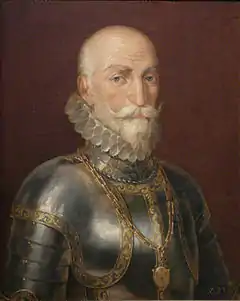
Álvaro de Bazán, 1st Marquis of Santa Cruz
- 3rd Duke of Alba (Fernando Álvarez de Toledo, 1507–1582), general and governor of the Spanish Netherlands (1567–1573)
- Diego de los Ríos (1850–1911) Spanish Governor-General of the Philippines
- Don Juan de Austria (1547–1578), general and admiral; defeated Müezzinzade Ali Pasha in the Battle of Lepanto (1571)
- Blas de Lezo (1687–1741), admiral; leading 6 warships and 3.700 men, defeated a British invasion force of 28.000 troops and 186 warships, during the Siege of Cartagena in 1741
- Álvaro de Bazán, 1st Marquis of Santa Cruz (1526–1588), admiral
- Francisco Javier Castaños, 1st Duke of Bailén (1758–1852), general; he defeated Dupont in the Battle of Bailén (1808)
- El Cid (Rodrigo 'Ruy' Díaz de Vivar, c. 1045–1099), knight and hero
- Gonzalo Fernández de Córdoba, "El Gran Capitán" (1453–1515), general and strategist of Early modern warfare
- Francisco Franco (1892–1975), general; from 1939 caudillo and formal Head of State of Spain
- Manuel Alberto Freire de Andrade y Armijo (1767–1835), Spanish cavalry officer and general officer during the Peninsular War, and later Defense Minister
- Bernardo de Gálvez (1746–1786), Field Marshal and governor of Louisiana, Spanish hero of the American Revolution
- Juan Martín Díez, "El Empecinado" (1775–1825), head of guerrilla bands promoted to Brigadier-General of cavalry during the Peninsular War
- Casto Méndez Núñez (1830–1880), admiral
- Pedro Navarro, Count of Oliveto (c. 1460–1528), prominent general
- Álvaro de Navia Osorio y Vigil, Marqués de Santa Cruz de Marcenado, (1684–1732), general, author of the treatise Reflexiones Militares (Military Reflections)
- Alexander Farnese, Duke of Parma (1545–1592), Spanish general and military governor of the Spanish Netherlands
- Ambrosio Spinola, marqués de los Balbases (1569–1630), general
- Fernando Villaamil (1845–1898), naval officer, designer of the first destroyer
Models
- Esther Cañadas (born 1977)
- Jon Kortajarena (born 1985)
- Sheila Marquez (born 1985)
- Judit Mascó (born 1969)
- Marina Pérez (born 1984)
- Inés Sastre (born 1973)
Musicians
Classical
- Isaac Albéniz (1860–1909), composer
- Salvador Bacarisse (1898–1963), composer
- Pablo Casals (1876–1973), cello player and conductor
- Manuel de Falla (1876–1946), composer
- Rafael Frühbeck de Burgos (born 1933), conductor
- Enrique Granados (1867–1916), composer
- Enrique Jordá (1911–1996), conductor, music director of the San Francisco Symphony (1954–1963)
- Francisco Lara (born 1968), composer and conductor
- Alicia de Larrocha (1923–2009), pianist
- Vicente Martín y Soler (1754–1806), composer
- Luis de Pablo (born 1930), composer
- Blas de Laserna, composer
- Eugenia Osterberger (1852–1932), Galician pianist and composer
- Joaquín Rodrigo (1901–1999), composer and pianist, known for his Concierto de Aranjuez
- Gaspar Sanz (1640–1710), composer, dominate figure of Spanish baroque music
- Jordi Savall (born 1941), early and baroque music conductor and viol player
- Andrés Segovia (1893–1987), classical guitarist
- Antonio Soler (1729–1783), composer, known for his harpsichord sonatas
- Francisco Tárrega (1852–1909), composer and classical guitarist
- Joaquín Turina (1882–1949), composer
- Tomás Luis de Victoria (1548–1611), the most famous composer of the 16th century (late Renaissance) in Spain
- Paco de Lucía (1947–2014), flamenco guitarist and composer; regarded as one of the finest guitarists in the world and the greatest living guitarist of the flamenco genre
Opera singers
- Victoria de los Ángeles (1923–2005), soprano
- Maite Arruabarrena (born 1964), mezzo-soprano
- Teresa Berganza (born 1935), mezzo-soprano
- Montserrat Caballé (born 1933), soprano
- Nancy Fabiola Herrera (born 19??), mezzo-soprano
- José Carreras (born 1946), one of The Three Tenors
- Antonio Cortis (1891–1952), tenor
- Plácido Domingo (born 1941), one of The Three Tenors
- Manuel del Pópulo Vicente García (1775–1832), tenor
- María Gay (1879–1943), mezzo-soprano
- Alfredo Kraus (1927–1999), tenor
- Hipólito Lázaro (1887–1974), tenor
- Carlos Marín (born 1968), baritone, member of operatic quartet Il Divo
- María José Montiel', mezzo-soprano
- María Orán (1943–2018), soprano
- Adelina Patti (1843–1919), coloratura soprano
- Conchita Supervía (1895–1936), mezzo-soprano
- Francisco Viñas (1863–1933), tenor
Singers
- Alaska (born 1963), pop-rock singer
- Pablo Alboran (born 1989), singer
- Eva Amaral (born 1972), pop and folk rock singer
- Ana Belén (born 1951), singer and actress
- David Bisbal (born 1979), Almeria singer-songwriter
- Miguel Bosé (born 1956), pop singer
- Nino Bravo (1944–1973), singer
- Camarón de la Isla (1950–1992), flamenco singer, real name José Monje Cruz
- Luz Casal (born 1958), pop singer
- Rocío Dúrcal (1944–2006), singer
- Manolo Escobar (1931–2013), singer
- Manolo García (born 1955), singer-songwriter
- Enrique Iglesias (born 1975), singer
- Julio Iglesias (born 1943), pop singer
- Rocío Jurado (1946–2006), singer
- Lola Flores (1923–1995), singer and flamenco dancer
- Lolita Flores (born 1958), singer and actress
- Víctor Manuel (born 1947), singer
- Alba Molina (born 1978), Flamenco singer
- Amaia Montero (born 1976) pop singer
- Carlos Núñez (born 1971), bagpipes and Galician (Celtic) music performer
- Paloma San Basilio, singer
- Jordi Savall (born 1941), film music composer
- José Luis Perales (born 1945), singer
- Camilo Sesto (born 1946), singer
- Isabel Pantoja (born 1956), singer
- Niña Pastori, (born María Rosa García García in 1978), flamenco singer
- José Luis Perales (born 1945), singer
- Raphael (born 1943), pop singer
- Joaquín Sabina (born 1949), singer-songwriter
- Alejandro Sanz (born 1968), pop singer
- Joan Manuel Serrat (born 1943), Catalan singer-songwriter
- Ana Torroja (born 1959), pop rock singer
- Enrique Urquijo (1960–1999), founder of the band Los Secretos with his brother Álvaro, lead voice and composer
Philosophers and humanists
- Alfonso X of Castile (1221–1284), "El Sabio" ("The Wise")
- Francisco de Enzinas (1518–1552), humanist and translator of the New Testament
- Francisco Giner de los Ríos (1839–1915), philosopher, educator and one of the most influential Spanish intellectuals at the end of the 19th and the beginning of the 20th century.
- Baltasar Gracián (1601–1658), author of El Criticón, influenced European philosophers such as Schopenhauer
- Bartolomé de Las Casas (1484–1566), humanist, advocate of the rights of Native Americans
- Salvador de Madariaga (1886–1978), humanist, co-founder of the College of Europe (1949)
- Gregorio Marañón (1887–1960), humanist and medical scientist, important intellectual of the 20th century in Spain
- Marcelino Menéndez Pelayo (1856–1912), philologist, historian and erudite
- Julián Marías (1914–2005), philosopher; wrote the History of Philosophy
- Ramón Menéndez Pidal (1869–1968), philologist, historian and erudite member of Generation of '98
- Antonio de Nebrija (1441–1522), scholar, published the first grammar of the Spanish language (Gramática Castellana, 1492), which was the first grammar produced of any Romance language
- José Ortega y Gasset (1883–1955), philosopher, social and political thinker, author of The Revolt of the Masses (1930)
- Bernardino de Sahagún (1499–1590), Franciscan missionary, researched Nahua culture and Nahuatl language and compiled an unparalleled work in Spanish and Náhuatl
- George Santayana (1863–1952), philosopher, taught at Harvard, author of The Sense of Beauty (1896) and The Life of Reason (1905–6)
- Fernando Savater (born 1947), philosopher and essayist, known for his writings on ethics
- Francisco Suárez (1548–1617), one of the most influential scholastics after Thomas Aquinas
- Miguel de Unamuno (1864–1936), existentialist writer and literary theoretician
- Juan Luis Vives (1492–1540), prominent figure of Renaissance humanism, taught at Leuven and Oxford (while tutor to Mary Tudor)
- Xavier Zubiri (1889–1983), philosopher, critic of classical metaphysics
Religion
- Francisco Jiménez de Cisneros (1436–1517), religious reformer, bishop, cardinal and statesman
- St Dominic of Guzmán (1170–1221), founder of the Order of Preachers
- St Isidore of Seville (c. 560–636), bishop, humanist and doctor of the Church
- St Ignatius of Loyola (1491–1556), founder of the Society of Jesus
- St John of Avila (1500–1569), priest, preacher, theologian and mystic
- St John of the Cross (1542–1591), mystic and monastic reformer, doctor of the Church
- Saints Nunilo and Alodia (died c. 842/51), child martyrs
- Vicente Enrique y Tarancón (1907–1994), bishop, cardinal and president of the Spanish Episcopal Conference
- St Teresa of Avila (1515–1582), mystic and monastic reformer, doctor of the Church
- Tomás de Torquemada (1420–1498), Grand Inquisitor
- St Joaquina Vedruna (1783–1854), founder of the Carmelite Sisters of the Charity
- St Vincent Martyr (died c. 304), deacon martyr
- St Francis Xavier (1506–1552), missionary and co-founder of the Society of Jesus
- Peter of Saint Joseph Betancur (1626–1667), missionary in Guatemala
- José de Anchieta (1534–1597), missionary in Brazil; founder of city Sao Paulo and co-founder of city Rio de Janeiro
Science and technology
- José de Acosta (1540–1600), one of the first naturalists and anthropologists of the Americas
- Alex Aguilar (born 1957), professor of Animal Biology at the University of Barcelona
- Susana Agustí (graduated 1982), biological oceanographer, educator
- José María Algué (1856–1930), meteorologist, inventor of the barocyclometer, the nephoscope, and the microseismograph
- Rafael Alvarado Ballester (1924–2001)
- Jerónimo de Ayanz y Beaumont (1553–1613), registered design for steam-powered water pump for use in mines (1606)
- Ignacio Barraquer (1884–1965), leading ophthalmologist, pioneer of cataract surgery
- José Ignacio Barraquer (1916–1998), leading ophthalmologist, father of modern refractive surgery; invented the microkeratome and the cryolathe, developed the surgical procedures of keratomileusis and keratophakia
- Ángel Cabrera (1879–1960), naturalist, investigated South American fauna
- Nicolás Cabrera (1913–1989), physicist, did important work on the theories of crystal growth and the oxidisation of metals
- Santiago Calatrava (born 1951), architect, sculptor and structural engineer
- Pedro Carlos Cavadas Rodríguez (born 1965), pioneering surgeon
- Juan de la Cierva (1895–1936), aeronautical engineer, pioneer of rotary flight, inventor of the autogyro
- Juan Ignacio Cirac Sasturain (born 1965), one of the pioneers of the field of quantum computing and quantum information theory
- Josep Comas i Solà (1868–1937), astronomer, discovered the periodic comet 32P/Comas Solá and 11 asteroids, and in 1907 observed limb darkening of Saturn's moon Titan (the first evidence that the body had an atmosphere)
- Carmen Domínguez (born 1969), glaciologist
- Pedro Duque (born 1963), astronaut and veteran of two space missions
- Fausto de Elhúyar (1755–1833), chemist, joint discoverer of tungsten with his brother Juan José de Elhúyar in 1783
- Carlos Fernández Casado (1905–1988), civil engineer, designer and builder of bridges and viaducts
- Jaime Ferrán (1852–1929), doctor and researcher, discovered several vaccines
- Bernardo Hernández (born 1970), entrepreneur, leading figure in technology
- Francisco Hernández (1514–1587), botanicist, carried out important research about the Mexican flora
- Manuel Jalón Corominas (1925–2011), inventor of the mop (1956) and a worldwide used "two-piece" disposable syringe (1978)
- Carlos Jiménez Díaz (1898–1967), doctor and researcher, leading figure in pathology
- Asunción Linares (1921–2005), paleontologist
- Gregorio Marañón (1887–1960), doctor and researcher, leading figure in endocrinology
- Narcís Monturiol (1818–1885), physicist and inventor, pioneer of underwater navigation and first machine powered submarine
- José Celestino Bruno Mutis (1732–1808), botanicist, doctor, philosopher and mathematician, carried out relevant research about the American flora, founded one of the first astronomic observatories in America (1762)
- Severo Ochoa (1905–1993), doctor and biochemist, achieved the synthesis of ribonucleic acid (RNA), Nobel prize laureate (1959)
- Mateu Orfila (1787–1853), doctor and chemist, father of modern toxicology, leading figure in forensic toxicology
- Joan Oró (1923–2004), biochemist, carried out important research about the origin of life, he worked with NASA on the Viking missions
- Julio Palacios Martínez (1891–1970), physicist and mathematician
- Isaac Peral (1851–1895), engineer and sailor, designer of the first fully operative military submarine
- Santiago Ramón y Cajal (1852–1934), father of Neuroscience, Nobel prize laureate (1906)
- Julio Rey Pastor (1888–1962), mathematician, leading figure in geometry
- Wifredo Ricart (1897–1974), engineer, designer and executive manager in the automotive industry
- Andrés Manuel del Río (1764–1849), geologist and chemist, discovered vanadium (as vanadinite) in 1801
- Pío del Río Hortega (1882–1945), neuroscientist, discoverer of the microglia or Hortega cell
- Josef de Mendoza y Ríos (1761–1816) was a Spanish astronomer and mathematician of the 18th century, famous for his work on navigation.
- Félix Rodríguez de la Fuente (1928–1980), naturalist, leading figure in ornithology, ethology, ecology and science divulgation
- Enrique Rojas Montes (born 1949)
- Margarita Salas (born 1938), biochemist, molecular geneticist and researcher
- Miguel Sarrias Domingo (1930–2002) was Medical Director of the Institut Guttmann in Barcelona.
- Miguel Servet (1511–1553), scientist, surgeon and humanist; first European to describe pulmonary circulation
- María Dolores Soria (1948–2004), paleontologist, researcher, professor, and biologist
- Esteban Terradas i Illa (1883–1950), mathematician, physicist and engineer
- Leonardo Torres Quevedo (1852–1936), engineer and mathematician, pioneer of automated calculation machines, inventor of the automatic chess, pioneer of remote control, designer of the funicular over the Niagara Falls
- Eduardo Torroja (1899–1961), civil engineer, structural architect, world-famous specialist in concrete structures
- Josep Trueta (1897–1977), doctor, his new method for treatment of open wounds and fractures helped save many lives during World War II
- Antonio de Ulloa (1716–1795), scientist, soldier and author; joint discoverer of element platinum with Jorge Juan y Santacilia (1713–1773)
- Arnold of Villanova (c. 1235–1311), alchemist and physician, he discovered carbon monoxide and pure alcohol
Social scientists
- Martín de Azpilicueta (1492–1586), economist, member of the School of Salamanca, precursor of the quantitative theory of money
- Manuel Castells (born 1942), sociologist, author of trilogy The Information Age
- María Ángeles Durán (born 1942), sociologist and economist
- Manuel Fernández López (1947–2014)
- Salvador Giner (born 1934), sociologist, he had researched on social theory, sociology of culture and modern industrial society
- Jesús Huerta de Soto (born 1956), major Austrian School economist
- Juan José Linz (1926–2013), Sterling Professor of Political and Social Science at Yale; Prince of Asturias Award (1987) and Johan Skytte Prize (1996) laureate
- Claudio Sánchez-Albornoz (1893–1984), historian, prominent specialist in medieval Spanish history
- Joseph de la Vega (1650–1692), businessman, wrote Confusion of Confusions (1688), first book on stock markets
- Francisco de Vitoria (c. 1480/86–1546), member of the School of Salamanca, precursor of international law theory
Sports
Athletics
- Fermín Cacho Ruiz (born 1969), 1500 metres gold (1992 Olympics) and silver (1996 Olympics) medalist
- Francisco Javier Gómez Noya (born 1983), triathlon silver (London 2012) medalist; four times ITU Triathlon world champion
Basketball
- Antonio Díaz-Miguel (1933–2000), coach, enshrined in the Basketball Hall of Fame in 1997
- Pau Gasol (born 1980), FC Barcelona and Los Angeles Lakers player, 2001–02 NBA Rookie of the Year Award winner; 2006 FIBA W.C. MVP
- Marc Gasol (born 1985), player for Memphis Grizzlies (2008–2019) and Toronto Raptors (2019–present)
- Fernando Martín (1962–1989), Estudiantes, Real Madrid and Portland Trail Blazers player
- Jan Martín (born 1984), German-Israeli-Spanish basketball player
- Juan Carlos Navarro (born 1980), FC Barcelona and Memphis Grizzlies player
Boxing
- Pedro Carrasco (1943–2001), 1967 European Lightweight Champion; 1971 WBC's World Lightweight Champion
- Javier Castillejo (born 1968), two-time WBC World Jr. Middleweight Champion and one-time WBA Middleweight champion
Cycling
- Federico Martín Bahamontes (born 1928), 1959 Tour de France winner
- Juan José Cobo (born 1981), 2011 Vuelta a España winner
- Alberto Contador (born 1982), three-time Tour de France (2007,2009,2010), 2008 Giro d'Italia, 2008 Vuelta a España winner
- Pedro Delgado (born 1960), 1988 Tour de France winner
- Óscar Freire (born 1976), three-time World Cycling Champion (1999, 2001, 2004)
- José Manuel Fuente (1945–1996), twice Vuelta a España winner (1972, 1974), second in Giro d'Italia (1972), third in Tour de France (1973)
- Roberto Heras (born 1974), three-time Vuelta a España winner (2000, 2003, 2004)
- Miguel Indurain (born 1964), gold medalist (1996 Olympics), 1995 World Time-Trial Champion, World Hour recordman (1994), five consecutive times Tour de France winner (1991–1995), twice Giro d'Italia winner (1992, 1993)
- Joan Llaneras (born 1969), gold medalist (2000 Olympics), silver medalist (2004 Olympics), seven-time World Points race or Madison Track Cycling Champion (1996, 1997, 1998, 1999, 2000, 2006, 2007)
- Luis Ocaña (1945–1994), 1973 Tour de France winner
- Abraham Olano (born 1970), 1995 World Cycling Champion and 1998 World Time-Trial Champion
- Óscar Pereiro (born 1977), 2006 Tour de France winner
- Samuel Sánchez (born 1978), Beijing 2008 Olympic Road Race Gold Medal
- Carlos Sastre (born 1975), 2008 Tour de France winner
- Joane Somarriba (born 1972), three-time Grande Boucle winner (2000, 2001, 2003)
- Guillermo Timoner (born 1926), six-time World Motor paced Track Cycling Champion (1955, 1959, 1960, 1962, 1964, 1965)
Football (soccer)
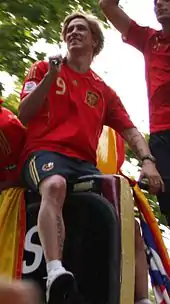
Torres celebrating victory with Spain at Euro 2008
- Iker Casillas (born 1981), goalkeeper and Real Madrid; captain of Spain's team that won UEFA Euro 2008, the 2010 FIFA World Cup and Euro 2012
- Francisco Gento (born 1933), Real Madrid player; winner of six UEFA Champions League
- Raúl González (born 1977), first player to reach 50 goals in UEFA Champions League
- Xavi Hernández (born 1980), midfielder and FC Barcelona player; UEFA Euro 2008 MVP
- Andrés Iniesta (born 1984), midfielder and FC Barcelona player; scored the winning goal at the 2010 FIFA World Cup Final; UEFA Euro 2012 MVP
- Fernando Torres (born 1984), striker and Chelsea player; scored the winning goal at the Euro 2008 Final; winner of Golden Boot at Euro 2012
- David Villa (born 1981), striker and FC Barcelona player; Spain's all-time top goalscorer
- Andoni Zubizarreta (born 1961), Spanish international
- Gerard Pique (born 1979), plays for the club FC Barcelona, and is a defender
Golf
- Seve Ballesteros (1957–2011), winner of five major championships
- Sergio García (born 1980), winner of a major championship
- Miguel Ángel Jiménez (born 1964), winner of 13 European Tour titles winner
- José María Olazábal (born 1966), winner of two major championships
Motor sports
- Fernando Alonso (born 1981), 2005 and 2006 Formula One World Champion
- Jaime Alguersuari (born 1990), 2008 British Formula Three champion
- Álvaro Bautista (born 1984), motorcycle racing raider, 125cc champion of the World in 2006
- Carlos Checa (born 1972), GP motorcycle racing rider and Superbike World Champion in 2011
- Marc Coma (born 1976), won the Dakar Rally in 2006
- Àlex Crivillé (born 1970), 500cc GP motorcycle racing World Champion in 1999
- Marc Gené (born 1974), Formula One driver
- Jorge Lorenzo (born 1987), 2006 and 2007 GP motorcycle racing 250cc World Champion, 2010, 2012, and 2015 MotoGP World Champion
- Marc Márquez (born 1993), Grand Prix motorcycle road racer, and is the 2013, 2014, 2016 and 2017 Moto GP World Champion
- Jorge Martínez Aspar (born 1962), GP motorcycle racing rider, four-time World Champion
- Pedro Martínez de la Rosa (born 1971), Formula One driver
- Ángel Nieto (born 1947), GP motorcycle racing rider, 12+1 times World Champion
- Daniel Pedrosa (born 1985), youngest GP motorcycle racing World Champion of 125cc and 250cc
- Carlos Sainz (born 1962), 1990 and 1992 World Rally Champion and 2010 Dakar Rally winner
- Carlos Sainz, Jr. (born 1994), Formula One driver
Rugby union
- Oriol Ripol, professional rugby union player for Worcester Warriors; considered the greatest Spaniard to ever play the game
- Cédric Garcia, professional rugby player for Aviron Bayonnais
Tennis
- Galo Blanco (born 1976), professional tennis player
- Sergi Bruguera (born 1971), 1993 and 1994 French Open Men's Singles Champion
- Àlex Corretja (born 1974), 1998 ATP Tour World Champion
- Albert Costa (born 1975), 2002 French Open Men's Singles Champion
- Juan Carlos Ferrero (born 1980), 2003 French Open Men's Singles Champion
- Andrés Gimeno (born 1937), 1972 French Open Men's Singles Champion
- Conchita Martínez (born 1972), 1994 Wimbledon Women's Singles Champion
- Carlos Moyá (born 1976), 1998 French Open Men's Singles Champion
- Garbiñe Muguruza (born 1993), 2016 French Open and 2017 Wimbledon Women's Singles Champion
- Rafael Nadal (born 1986), former World Number 1, 2005 French Open, 2006 French Open, 2007 French Open, 2008 French Open, 2010 French Open, 2011 French Open, 2012 French Open 2013 French Open, 2014 French Open, 2017 French Open, 2008 Wimbledon, 2010 Wimbledon, 2009 Australian Open, 2010 US Open, 2013 US Open, 2017 US Open Men's Singles Champion, 2008 Olympics and 2016 Olympics gold medallist
- Manuel Orantes (born 1949), 1975 U.S. Open Men's Singles Champion
- Virginia Ruano Pascual (born 1973), eight Grand Slam Doubles titles winner
- Arantxa Sánchez Vicario (born 1971), ten Grand Slam titles winner (four singles, six doubles)
- Emilio Sánchez Vicario (born 1965), three Grand Slam Doubles titles winner
- Javier Sánchez Vicario, professional tennis player, brother of Aranxta
- Manuel Santana (born 1938), 5 Grand Slam titles winner (four singles, one doubles)
- Fernando Verdasco Carmona (born 1983), professional tennis player
Others
- Graciano Canteli, diplomat
- Carlos Dominguez Cidon (1959–2009), chef
- Pilar Civeira, professor of medicine in Pamplona
- Charo Sádaba, professor of advertising in Pamplona
- María Josefa Cerrato Rodríguez (1897–1981), first woman veterinarian
- José Andrés (born 1969), chef
- Ferran Adrià (born 1962), chef
- Joaquín Cortés (born 1969), dancer
- Juan March Ordinas (1880–1962), politician and businessman
- Amancio Ortega Gaona (born 1936), entrepreneur
- Pepita de Oliva (1830–1871), dancer
- Ana María Pérez del Campo (born 1936), lawyer, feminist
- Juan Pujol, alias Garbo (1912–1988), double agent who played a key role in the success of D-Day towards the end of World War II
- Tamara Rojo (born 1974), prima ballerina of the London's Royal Ballet (since 2000); Prince of Asturias Award of Arts laureate (2005)
- Diego Salcedo (1575–1644), first Spaniard killed by Puerto Rican Taínos
- Elbira Zipitria (1906–1982), Spanish-Basque educator, promoter of the Basque language
See also
- List of people by nationality
- List of Andalusians
- List of Aragonese
- List of Balearics
- List of Basques
- List of Catalans
- List of Galician people
- List of Spanish Jews
- List of Valencians
External links
This article is issued from Wikipedia. The text is licensed under Creative Commons - Attribution - Sharealike. Additional terms may apply for the media files.

.svg.png.webp)



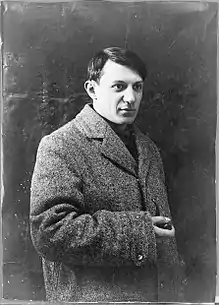
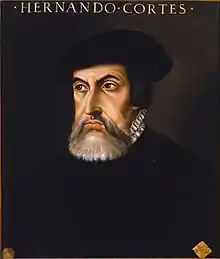




.jpg.webp)
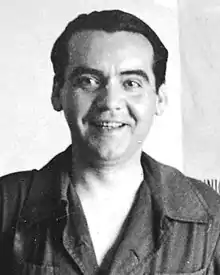
.jpg.webp)




